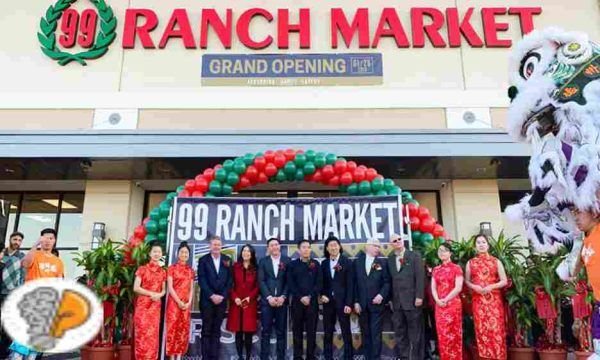Since opening its initial location in Westminster, California, in 1984, 99 Ranch Market has spread throughout the nation’s major Asian neighborhoods.
Roger Chen, the company’s founder and a new immigrant from Taiwan, desired the comforting noises, aromas, and cuisine of home in an American supermarket setting.
In terms of supermarket alternatives, American consumers are spoilt for choice. Even the tiniest villages are home to several supermarkets, budget businesses, mom-and-pop shops, upscale “yuppy marts,” and ethnic markets of all kinds.
Yet for many of the 21 million Asian Americans living in the country, food shopping has long meant going to 99 Ranch Market.
Among the biggest Asian neighborhoods in America, the grocery store chain is pervasive. Such marketplaces frequently serve the specific requirements of Asian groups; for instance, smaller shops offering South Asian, Southeast Asian, and Japanese items. Yet, only 99 Ranch and its lone rival, the Korean-American H Mart, can provide the vast range of demands of the Asian-American population.
The Largest Chain of Asian Supermarkets In The US is 99 Ranch Market
The story of 99 Ranch Market begins in 1984, in Westminster, California, outside Los Angeles. Then, as now, Westminster was best known for its large Vietnamese population. Nevertheless, Roger Chen, a recent arrival from Taiwan, decided to open his first market there. (Originally it was called 99 Price Market, a name which later changed to what is known today.)
“He missed his hometown – the familiar sounds, the smells, and the food,” says Alice Chen, CEO of 99 Ranch Market and the founder’s daughter. “He wondered why he couldn’t shop for those foods and brands that were familiar from home here, in a grocery environment similar to his local American supermarket.”
According to Alice Chen, her father has always put his career as a businessman first. He recognized a gap, saw a need, and had the idea to close it.
99 Ranch Market quickly spread throughout California as a result of the state’s rapidly growing Asian population. Later, in Seattle, Washington, in 1998, Chen launched his first store outside of California. There are already 52 locations throughout seven states, and 99 Ranch Market has a promising future.
Asian Americans made up more than 21 million people in 2016, according to the US Census Bureau, a considerable rise from the estimated 3.5 million people in 1980, four years before Chen launched his first store.
As The Number of Immigrants From Asia Increases
The Chen family, which includes Alice Chen and her brother Jonson Chen, still controls the business. Jonson runs his own business, much like his father. To keep his family firm expanding and competitive, he has made it his mission to modernize the whole organization. He is doing this thanks to his Wharton Business School degree.
After graduating from high school, he says, “I started in Northern California, learning about the family company, and going through all the levels there.” “My father wished for me to be familiar with every department.
Even as a high school student, I spent the summers stacking shelves at the markets. Several of the technologies used in retail were evolving when I first started in the early 2000s.
He started by computerizing the processes and transferring the entire system to Windows Vista, which at the time was cutting-edge hardware. Nowadays, 99 Ranch is a cutting-edge retailer that provides online shopping as well as a virtual community gathering place where people can share recipes, promote the store’s ongoing customer competitions, and post about deals and exclusive offers around the country.
Running The 99 Ranch Network And Ensuring That It Is Fully Stocked
Running the 99 Ranch network and ensuring that it is fully stocked with the greatest variety of commodities is a difficult task. Consumers prefer the stores because they need ingredients that are unavailable elsewhere. They come from a variety of backgrounds, have wildly dissimilar culinary and shopping traditions, and are a growing and increasingly varied group. Several new immigrants are familiar with goods from their own countries and are adamant about maintaining authenticity.
We are a pan-Asian supermarket. We serve a wide range of customers, not simply Chinese ones, said Jonson Chen. People from all of Southeast Asia, including the Philippines, Thailand, and Vietnam, have discovered our market to be accessible, which is why we’re so special.
The “generation gap,” as Chen refers to it, must also be taken into account. While his father mostly catered to Asian-American first-generation immigrants, many of the younger customers at 99 Ranch these days have grown up in the US and have an appreciation for both Western food and products as well as the Asian cuisine their parents served. Think wasabi-flavored potato crackers or sauerkraut-flavored instant noodles when you think of 99 Ranch.
The younger Chen believes the company must continue to be adaptable and meet consumers’ requirements regardless of how they may change.
In Terms Of The Cross-generational Transfer, “We’ve Been Doing A Better Job,” He Claims.
It’s not only wise business practice; it also serves as a key differentiator for 99 Ranch. Several of our rivals just pay attention to the requirements of that first generation.
He notes that the US government is another obstacle for 99 Ranch. Due to need, the company does business with foreign producers and brands. It takes a lot of work to make sure that every product complies with the US’s sometimes ambiguous health and safety regulations.
By keeping as much of the business’ operations in-house as feasible, the company has overcome these difficulties. Customers may only perceive a market, but there is a company-owned network of farms, factories, and industrial facilities that stretches from China to the United States. The management can assure, through stringent inspection, that even its Asian manufacturing plants comply with the complex rules of the US Federal Drug Administration.
We collaborate with a range of suppliers, both big and small, adds Chen. Up to the large Japanese businesses, “We literally have the men who create fresh tofu and soy milk every day and bring it in a minivan.”
Alice Chen discusses the origin of the founder’s odd moniker. The concepts of luck and freshness were personified by “99 Ranch Market” for her father, she says. “99” is a homophone meaning “longevity and good fortune” in Mandarin.
The company’s motto is still “For 100, we try harder.”
Also, according to the CEO, her father associated the phrases “ranch” and “market” with a location where people went to buy the finest livestock and products.
He Probably Didn’t Realise The Name Would Be So Confusing.
We work with local governments to cooperate on educational shop tours, and we conduct free cooking courses to teach our communities about Asian delicacies.
99 Ranch is becoming more than simply a supermarket. It is now a proud representation of the thriving Asian-American community. Foodies are aware that good Asian restaurants will always be present when there is a 99 Ranch. Real estate professionals have started searching for new 99 Ranch vacancies since they are aware that a new market is frequently the first indication of interest from the fast-growing Asian-American community and a definite sign that property prices are set to increase.
The Chicken-And-The-Egg Problem Exists, According to Jonson Chen
The community either grows around us or we grow the community. We build Asian-American communities around these establishments as we construct them.
By supporting neighborhood organizations, holding cultural events, and openly sharing recipes with individuals for whom Asian ingredients might be unfamiliar, 99 Ranch Market has embraced its position in the community.
Alice Chen explains that her organization “educates our communities about Asian delicacies through initiatives [such as] providing free cooking lessons and collaborating with local governments in informative store visits.” “We give back to our communities via programs that support a healthy lifestyle, fight hunger, and preserve the environment.”
It’s extremely possible that a 99 Ranch Market was where many non-Asian Americans saw Asian culture for the first time. There is no better way to introduce them to their new neighbors than via their food.

